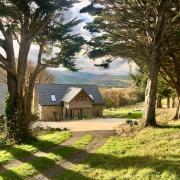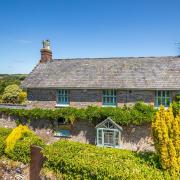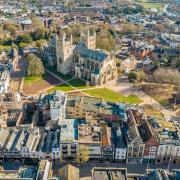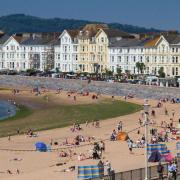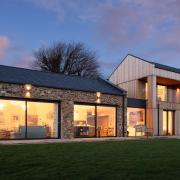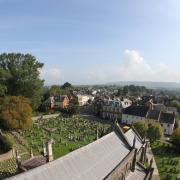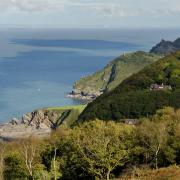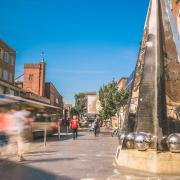A new kind of visitor is seeking out the South Devon Town of Totnes, writes Trudy Turrell. Photos Kate Mount
A Wednesday morning in early spring and Amanda Richards, manager of the Tourist Information Centre, fields another call from a potential visitor to Totnes. The fabulous historic town, which boasts more listed buildings per head of population than any in Britain, as well as holding the media title for ‘Britain’s funkiest’, also happens to be the country’s first Transition Town. The Transition movement, which started here in late 2006, has rapidly spawned over 350 other transition ‘towns’ worldwide, from the floating village of Copenhagen to a huge favela in Brazil. A new boost to Totnes’s fame and local economy is from tourists keen to see what a transition town is like – and take home some sustainable ideas for their own patch. Before I took a tour myself, I headed off to Dartington to see co-founder of the Transition movement Rob Hopkins, and find out what transition is all about.
Seated by his laptop at the kitchen table, overlooking a productive, deep-bedded vegetable garden, he’s researching his new book, a follow-up to the 2008 Transition Handbook, which has currently sold over 25,000 copies and was a top choice of holiday reading for politicians that summer. Rob and his wife, Emma, are keen permaculturalists. Rob taught the first diploma permaculture course, in Kinsale, Southern Ireland, whilst also building his own cob house and running sustainable living courses. In 2006, Rob, Emma and their four sons moved to Totnes (a place with family connections), and with Dartington’s legacy of testing new ways of living, it seemed a fertile ground for trying out some low-carbon-living ideas on a town scale.
The concept of Transition only came about through a meeting with Naresh Giangrande set up by Totnes-born permaculture expert Andy Langford. Both had studied peak oil, and over a pint in The Cott, Rob’s 13th-century thatched local, they planned a series of talks and screenings which led to a the ‘unleashing’ of Transition Town Totnes to a gathering of over 400 locals packed into the Civic Hall.
Even in such an ‘enlightened’ town, where many would consider themselves some shade of green, few knew the impact that peak oil could have on their lives – and that we all consume more oil in the food that we eat that in our cars. “Wring out our modern lives and they drip oil,” Rob explains. Where on earth does a small town start to address a scenario that looks like a modern disaster movie?
It is a tribute to Rob and Naresh’s approach that they have informed, enthused and also dispelled feelings of despair amongst Totnesians. Rob describes the Transition approach as “more like a street party than a protest march”. It’s this hopeful, can-do approach that has attracted local people to get involved in imagining, and then getting on with planning for, a dramatically lower-energy future. Rob is still amazed at the way that transitioning has spread like wildfire, and often the small Transition Town Totnes office in Fore Street is inundated by calls from ‘transition pilgrims’ keen to see the new society in action.
Following in their footsteps, I took a walk through the town, guided by Hal Gilmore, TTT’s business, livelihoods and communications volunteer. Lots has happened since that unleashing in 2006, with groups of locals focusing on every aspect of local life – from food to education, transport to the local economy. Talking of which, it is estimated TTT has generated an additional �1million for the town.
Stepping outside TTT’s small office, I could understand a recent German visitor’s dismay at not finding a car-free Shangri-la. “The changes that Transition has brought have more to do with people’s behaviour,” Hal explained. “Totnes was already a town rich in independent shops, where people bought local food and ethical products. Just imagine any other small town with three butchers shops within a few doors of each other,” he mused. All sell local, high-welfare meat.
Close by is the Ticklemore Cheese Shop, with at least 90 of the cheeses on display made in the Westcountry. Annie’s Fruit and Veg is crammed with locally grown, squeaky-fresh vegetables, and the Ticklemore Fish Shop is busy with customers enjoying a banter as they buy. Further up Fore Street are boutique and specialist shops. Most display a Totnes Pound sign in their windows, welcoming Totnes’s own currency. Below timbered buildings is Conker Shoes whose handmade leather boots and shoes are a very sustainable alternative to shoes made in China or Brazil and can be re-soled again and again. Further up, Riverford Comes to Town started at the nearby farm, and Riverford now delivers 47,000 organic veg boxes per week far and wide.
Lining the side of the Civic Square is Greenlife, Totnes’s green supermarket. On Fridays and Saturdays, when this square is filled with market stalls selling local vegetables and fish, piles of organic bread, home-made creams and lotions, and lots of secondhand clothes and furniture, you could imagine what ‘sustainable shopping’ might be like.
On a non-market day, Hal took me to see the back of the bland 1960s Civic Hall, now covered in 75 photovoltaic (PV) solar panels. It’s an impressive flagship for the Transition Streets project. Soon there will be wind turbines on the hills just a mile or two away, funded largely by local shares, so that not only will Totnes be more ‘resilient’ (a popular Transition term) to oil price rises, but locals will be making money from the wind too.
Of the 40 or so projects happening around the town, most will be below the radar of the day visitor. From the top of Totnes’s Norman castle, we had a fabulous view of the town, with the River Dart flowing around it. “The reason that Totnes grew was its navigable river that carried everything – cider, cattle, timber from the Baltic – and it could do so again in oil-poor times,”’explains Hal. “Totnes has a station on the main Penzance to London line, a riverside cycle path, even a steam railway line. These could provide energy-efficient transport options for the future.”
CRASH COURSE What is Peak Oil ?
The world is running out of easily extractable oil reserves and we currently use three barrels for every new barrel of oil discovered. The International Energy Agency announced this year that conventional oil production peaked in 2006. The question is now whether unconventional oils (tar sands, deep water production) will be able to sustain demand and produce affordable oil. Witness the current rising prices.
Oily food
Our food travels on average 1,000-1,500 miles before we drive to the supermarket to buy it. Fertilised with oil-based chemicals, sown and harvested by machines, and packaged in plastic... less oily food will have to be organic and local.
Transition Streets
This is a course in energy-saving for neighbourhoods. To date 500 households have participated, many installing their own PV panels, assisted by a government grant secured by TTT. PV’s save each household around �600 per year and 1.2 tonnes of carbon.
Gardening everywhere
Courses, seed swaps, nut-tree planting and garden sharing have all proved popular in the bid to grow more food and give locals the skills they need to grow it. Community gardens are also being developed as answers for improved health and wellbeing. Local GPs will soon be prescribing gardening for its mental and physical health benefits to patients.
Green pounds
Local currency, spent and traded within the town, keeps cash in the local economy. For every ‘normal’ pound spent, 80p swiftly leaves the area.
Powering down
Planning for the future, locals have published an ‘Energy Descent Action Plan’. It is imaginative and surprisingly readable for a 300-page document and is already avidly read worldwide.
See totnesedap.org.uk
Devon Transition Towns
Ivybridge, Moretonhamstead, Ottery St Mary, Ashburton, Seaton, Exeter, Exmouth, Sidmouth, Crediton, Newton Abbot and Tavistock. Hal Gilmore arranges TTT tours for groups.
E-mail hal@greenspireproject.org.
transitiontowntotnes.org



